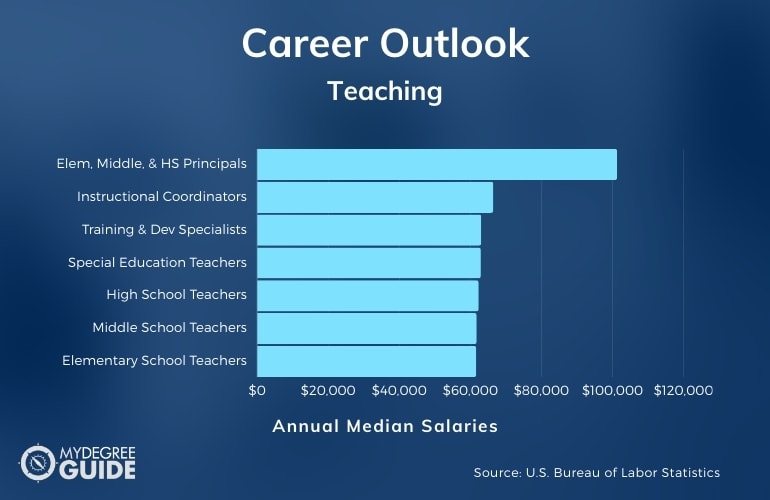Teachers help children develop the skills and knowledge they need, but is teaching a good career?

If you have a passion for helping others and explaining information, working in education could be a rewarding path. It takes several years of education and practical experience to become a teacher, and most institutions require their educators to be state licensed.
Editorial Listing ShortCode:
But many in this profession feel a sense of satisfaction and accomplishment when they support and guide their students.
Is Teaching a Good Career?

Yes, teaching is a good career field for many professionals. Teachers make a major impact every day when they go to work. They can form bonds with their students and can have a lasting influence on their lives as well as their communities.
There are also financial benefits of teaching. Data from the Bureau of Labor Statistics shows that elementary, middle, and high school teachers all have median annual salaries around $61,000. This is significantly higher than the median wage for all workers, which is $46,310.
Editorial Listing ShortCode:
If you’re interested in education but aren’t sure you want to spend the rest of your career in a classroom, a teaching role is an excellent steppingstone toward many other jobs. Some teachers go on to become school administrators, counselors, and advisors. Others pursue positions in the business world, where their time management, organizational, and people skills are an asset.
Keep in mind that your salary and career opportunities could differ substantially based on a number of factors, including your geographic location, work experience, and education level.
Teaching Major Curriculum

Degrees in education usually emphasize theoretical knowledge and practical skills. Although the specific curriculum depends on the program and your concentration, some of the most common courses for teaching majors include:
- Diversity of Learning
- Using Technology in Education
- Schools and Communities
- Classroom Management
- Assessment
- Educational Psychology and Human Development
- Issues and Trends in Learning and Teaching
- Comparative Education
- Multiculturalism, Race, and Ethnicity in Education
- Education and Public Policy
In addition, you can expect to take other courses based on the focus of your degree, such as elementary education or math instruction. Most degree programs also involve a student teaching experience, where you work in a classroom under the supervision of a certified teacher.
5 Things You Can Do with a Teaching Degree

The skills you can develop during a teaching degree are more versatile than many people realize. It’s helpful to look at all the possible career options that can benefit from a background in education.
1. Classroom Teacher
As a classroom teacher, you would work with students in a school environment. In an elementary school, teachers work with young children and cover a variety of subjects, such as math, writing, and science.
Middle and high school teachers usually focus on a single subject. Teachers also write lesson plans, administer assessments, and participate in school activities.
2. Instructional Coordinator

Although they don’t usually work directly with students, instructional coordinators help shape their educational experiences. They can write and revise objectives and lessons, provide teacher training, and develop new teaching techniques.
Instructional coordinators also analyze student performance and test scores to determine how a school can strengthen its assessments and curriculum.
3. Training and Development Specialist

Businesses turn to educators to help them create effective training programs for their employees. Training and development specialists evaluate an organization’s needs and create a program that will help them meet their productivity and safety goals.
Some training and development specialists provide training within the workplace. Others create courses and assessments for online classes or training facilities.
4. Preschool Director

Preschool directors manage all the elements of a school for young children. They hire and oversee the teachers and staff, arrange special activities, and create budgets. People in this role also create safe environments for students and interact with parents.
Other responsibilities for preschool directors can also include community outreach, payroll, and curriculum development.
5. School and Career Counselors

Students often need additional support, and school and career counselors provide it. They typically work in public or private schools, helping students cope with social issues, academic struggles, and decisions about college.
Editorial Listing ShortCode:
One of the primary duties of a career counselor is to provide aptitude assessments so students can identify their strengths and areas of interest.
Teaching Careers

A teaching career can lead you in many different directions. You might work with young children in an elementary school, write activities and learning objectives as a consultant, or help adult students prepare to earn their GED.
According to the Bureau of Labor Statistics, these are some of the most popular careers for people with an interest in education.
| Careers | Annual Median Salaries |
| Elementary, Middle, and High School Principals | $101,320 |
| Instructional Coordinators | $66,490 |
| Training and Development Specialists | $63,080 |
| Special Education Teachers | $62,950 |
| High School Teachers | $62,360 |
| Middle School Teachers | $61,810 |
| Elementary School Teachers | $61,690 |
| Kindergarten Teachers | $60,490 |
| Adult Basic and Secondary Education and ESL Teachers | $58,590 |
| Preschool and Childcare Center Directors | $49,690 |
Many of these careers are found in a variety of environments, including public and private schools, tutoring centers, and government agencies.
Should I Become a Teacher? Pros and Cons of Teaching

So, is being a teacher a good job? Before you commit to becoming a teacher, it’s beneficial to consider both the positive and negative aspects of the profession.
Some of the advantages of teaching include:
- Competitive salaries. The Bureau of Labor Statistics reports that the median annual salaries for most teaching positions are higher than the average for all occupations.
- Job stability. Schools are always looking for good teachers, and staffing shortages have increased the need.
- Satisfaction and growth. Teaching can be very rewarding professionally and personally as you help students gain new confidence and abilities.
- Long breaks. Schools usually close for several days or weeks around holidays and in the summer.
- In-demand skills. The strengths you develop as a teacher—including critical thinking, communication, and problem-solving—can easily transfer to other industries.
Like every career, teaching can also have its downsides. Some disadvantages of being a teacher include:
- Limited budgets. Schools often don’t have enough funding, so some teachers end up paying for classroom supplies.
- Professional development requirements. You may participate in multiple workshops, conferences, and activities each year.
- Periods without pay. Some teachers aren’t paid during the summer or extended breaks.
- Workload. Many teachers spend time outside of school grading papers, writing lesson plans, and leading extracurricular activities.
- Emphasis on test scores. Many schools focus heavily on student performance on standardized tests, which can affect how much flexibility an instructor has in designing activities.
While these points can help you decide whether being a teacher is the right path for you, it’s also helpful to evaluate your own interests, goals, and skills.
Teaching Licensure and Certifications

Most states require public school teachers to become certified or licensed. The criteria differ depending on where you work, but they usually include:
- Education. Earning a bachelor’s degree is a core requirement for licensure, and you may be required to have a degree with a specific focus, such as special education.
- Teacher preparation program. State boards usually require prospective teachers to complete an approved preparation program with a student teaching experience.
- Assessments. You may take one or more exams, such as the Praxis, demonstrating that you’ve developed basic teaching skills.
- Application. After meeting each of these requirements, you’ll complete a background check and pay a fee to receive for your state license.
- Professional development. Ongoing education is often necessary to maintain and renew your license.
In addition to earning state licensure, teachers can also become board certified through the National Board for Professional Teaching Standards (NBPTS).
Is Being a Teacher Worth It?

Yes, being a teacher is worth it for many students. Teaching continues to be a secure job field because education is essential to a strong society.
Teachers share their passions with their students, both in and out of the classroom. They can use their creativity to design exciting learning activities, and some even have the opportunity to serve as club leaders or sports coaches. A career in teaching also allows you to connect with the wider community. You’ll work with family members, participate in school events, and, most importantly, serve as a role model for your students.
You could take your first step toward this rewarding career today by exploring accredited teacher preparation programs aligned with your state’s requirements.

